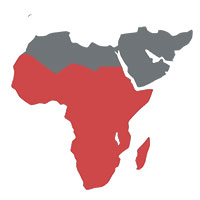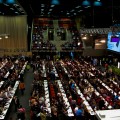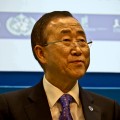African Group wants Kyoto Protocol Second Commitment Period
admin | December 5, 2011.
The African Group’s official position at COP17.
Ministers from over 50 African countries met on Monday to reinforce their position at the United Nations climate talks (COP17), demanding an ambitious second commitment period under the Kyoto Protocol, the only legally binding international climate change document. “We keep the African position as ambitious as possible, because we need to keep one billion people safe,” Tosi Mpanu-Mpanu, the chair of the African Group of negotiators said.
During the ‘high-level’ segment of COP17 which starts on Tuesday, the African Group will present the African Common Position on Climate Change as agreed to in Mali, earlier this year in September.
Mpanu-Mpanu announced that with adaptation as a priority, the African Group’s strategy will ensure that the outcomes of COP17 are comprehensive enough to protect Africans from the worst effects of climate change. “People in African countries have to walk further and further for access to water. We need to adapt to prevent conflict over these issues.”
According to the Intergovernmental Panel on Climate Change (IPCC), Africa will be the hit first and hardest hit by global climate change, and is among the least equipped to adapt to its adverse effects. “The impact that current and historic greenhouse gas emission is having on agriculture in Africa needs to be better understood in order for African negotiators to negotiate effectively, armed with the right kind of information outlined in this report,” Seyni Nafo, spokesperson of the African Group said.
More than one billion people in Africa, and millions of others living in small islands or vulnerable communities will bear the potentially catastrophic effects of land loss, food and water shortage, crop reduction and flooding. “We need to put emotions aside and focus on what the science tells us,” Mpanu-Mpanu said.
“Africa contributes the least carbon emissions, but is willing to do its fair share in emission reduction. We all have a responsibility to reduce emissions, the only difference is the historical position.”
“We want developed countries that have enjoyed a certain kind of life to show climate leadership. They have shown us economic leadership, human rights leadership, political leadership and sometimes even military leadership.”
According to Nafo, developed countries under the Kyoto Protocol should honour their commitments and reduce their greenhouse gas emissions by at least 40 percent from 2013 to 2017, which marks the second commitment period to Kyoto. “We stress the urgency of agreeing to a second commitment period in Durban and of elaborating measures to avoid a gap between commitment periods,” he said.
Mpanu-Mpanu added that the African Group is concerned because “the Kyoto Protocol makes provisions for people who don’t want it, to get out of it.” According to Mpanu, the European Union has suggested a politically binding second commitment. “We understand legally binding, but politically binding will be too unclear.”
Additionally, the group finds it incomprehensible that Japan, the motherland of where the Kyoto Protocol came to life, is backing out of the agreement. “Where’s the sense of honour of the agreement? It has created a really bad precedence. It takes a certain level of trust to ask developing countries to go into a legally binding commitment.”
“If you like the mango, you need to like the mango tree as well. Carbon markets, Clean Development Mechanisms (CDM) and the Kyoto Protocol go hand in hand. It’s a matter of supply and demand.”
Mpanu-Mpanu said the African Group is concerned that projects under CDM has been achieved at the lowest possible cost. “CDM was marketed to us as a wonderful tool to help Africa mitigate emissions. Unfortunately the mechanism goes into a perverse incentive scheme which benefits have not been pursued,” he said. “We should ensure that the rules are fairer and access to funding is easier.”
Securing the necessary climate finance forms a critical part of the official African position. “We’ve heard great things about the Green Climate Fund (GCF). Now some countries want to step back from it. It’s unacceptable. They have to walk the talk – we need the finance to cope.” Developed countries have pledged to jointly mobilise $100 billion per year by 2020.
“You have to be responsible if you commit to a legally binding instrument. If your country doesn’t keep its word, it shouldn’t be trusted.”
Mpanu-Mpanu stressed that they didn’t want ‘empty shells’, because the GCF can really make a difference in African countries.













comment